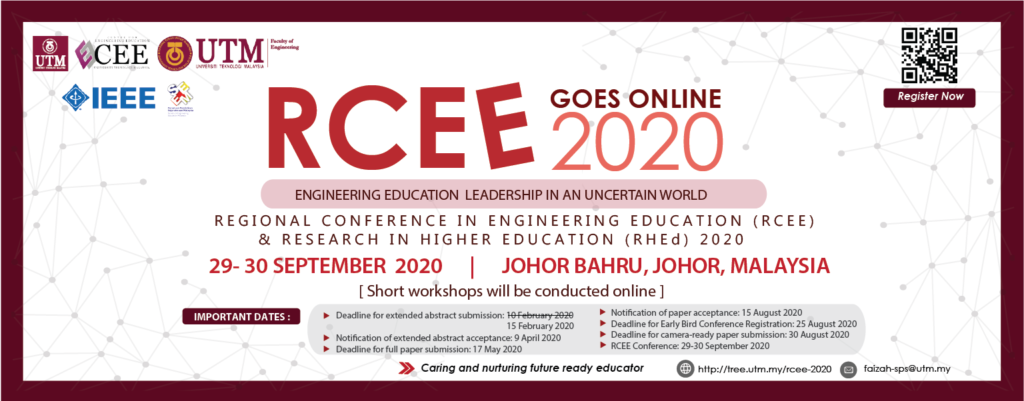
SPECIAL SESSIONS
Special Session 1 : Engaging Future Engineers Towards Embracing Sustainable Development
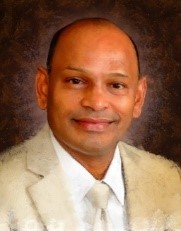
Professor Seeram Ramakrishna, FREng, Everest Chair
Professor Seeram Ramakrishna is the Chair of Circular Economy Taskforce at the National University of Singapore (NUS). He is a member of Enterprise Singapore’s and ISO’s Committees on ISO/TC323 Circular Economy and WG3 on Circularity. He is a member of the standards committee of Singapore Manufacturing Federation and Chair of Future of Manufacturing at the Institution of Engineers Singapore. He is an advisor to the National Environmental Agency’s CESS events. European Commission Director-General for Environment Daniel Calleja Crespo said “Professor Seeram Ramakrishna should be praised for his personal engagement leading the reflections on how to develop a more sustainable future for all” in his foreword for the Springer Nature book on Circular Economy (ISBN: 978-981-15-8509-8). He is a member of Norway and UNESCO’s Global Independent Expert Group on Universities and the 2030 Agenda (EGU2030). He is the Editor-in-Chief of the Springer NATURE Journal Materials Circular Economy – Sustainability. He teaches ME6501 Materials and Sustainability course. He also mentors Integrated Sustainable Design ISD5102 project students. He is an opinion contributor to the Springer Nature Sustainability Community. Microsoft Academic ranked him among the top 25 authors out of three million materials researchers worldwide based on H-index. He is named among the World’s Most Influential Minds (Thomson Reuters), and the Top 1% Highly Cited Researchers (Clarivate Analytics). He is an Impact Speaker at Canada University of Toronto’s Low Carbon Renewable Materials Center. He is a judge for the Mohammed Bin Rashid Initiative for the Global Prosperity. He advises technology companies with sustainability vision such as TRIA , CeEntek, and Green Li-Ion. He researches low-carbon materials as well as intelligent materials. His senior academic leadership roles include NUS University Vice-President (Research Strategy); Dean of NUS Faculty of Engineering; Director of NUS Enterprise; and Founding Chairman of Solar Energy Institute of Singapore. He is an elected Fellow of UK Royal Academy of Engineering (FREng); Singapore Academy of Engineering; Indian National Academy of Engineering; and ASEAN Academy of Engineering & Technology. He received PhD from the University of Cambridge, UK; and The TGMP from the Harvard University, USA.
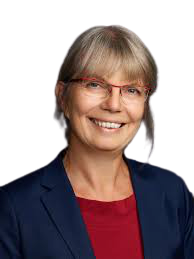
Prof Anette Kolmos, Aalborg University
Anette Kolmos is Professor in Engineering Education and PBL and Chairholder for UNESCO chair in Problem Based Learning, Aalborg University. During the last 20 years, she has researched following areas, primarily within engineering education: Development and evaluation of project based and problem based curriculum, Change from traditional to project organised and problembased curriculum, Development of transferable skills in PBL and project work, Methods for staff development. Dr. Kolmos is associate editor for the journal: Journal for Engineering Education, ASEE. Member of External Advisory Group for the EUprogramme: People. She is coordinator for the EU project, Socrates project, PBLEngineering which is developing the master programme: Problem Based Learning in Engineering and Science.
Special Session 2 : Nature and Technology- Effective Utilisation for Meaningful Learning
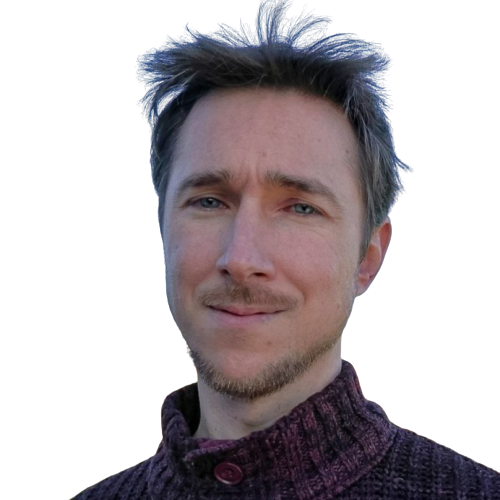
Professor Luis de la Torre, UNED and co-Founder of Nebulous Systems
Luis de la Torre is a Professor at the Computer Science and Automatic Control Department, UNED and co-Founder of Nebulous Systems, a company that provides IoT solutions for research, education and smart contexts. de la Torre received the M.Sc. degree in physics from the Complutense University of Madrid, Madrid, Spain, and the Ph.D. degree in computer science from UNED, Madrid. His current research interests include virtual and remote labs, distance education, and http protocols and technologies for networked control systems with event-based control techniques, and he has published over 20 articles in international journals in these and other topics. He has been a visiting scholar at Stanford University and the Swiss Federal Institute of Technology in Lausanne (EPFL) among others.
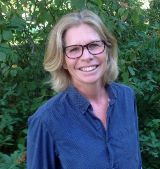
Anna Ekblad, Naturskolan i Lund, Sweden
Anna is a preschool teacher and specialist teacher in science and mathematics, serving students up to the age of 16. She has worked as a teacher for more than 25 years and the last ten years as education adviser at Naturskolan (The Nature School) in Lund, Sweden.
Naturskolan offers teachers in Lund ways to explore and develop different methods of teaching science and education for sustainable development (ESD) primarily using outdoor education in the community. The staff at Naturskolan strongly encourage use of the school grounds for learning. Everything Naturskolan offers is based on the Swedish National curriculum. Naturskolan (Nature School) is not a school with students. We act as a source of inspiration and support for all schools and pre-schools in the Lund area.
Naturskolan is acting in the centre of the Green School Grounds network, which is a long-term commitment that has been made for the transformation of the appearance and function of school grounds existing within the Lund Educational Authority. It is our strongly held belief that school grounds should be viewed as:
– A pedagogical resource that stimulate and encourage creativity.
– An expression of the school’s interaction with and interest in the natural world.
– Largely unrestricted areas that cater for different needs. Areas for physical exercise, socialisation areas, places to relax and unwind and areas that offer more excitement are all requirements that should be taken into consideration in the planning of school grounds.
– Diverse learning environments that demonstrate the various functions of the natural ecosystem.
National, Anna is also advisor for the Swedish National Agency for Education (Skolverket) in developing methods for teaching science outdoors.
International, Anna is a leadership council member of International School Ground Alliance, ISGA. ISGA is a global network of organizations and professionals, working to enrich children’s learning and play by improving the way school grounds are designed and used.
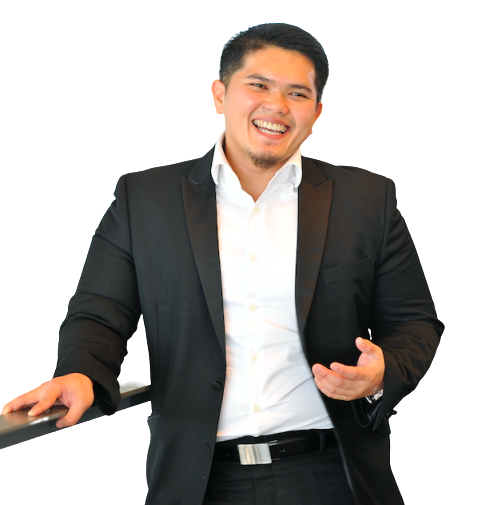
Assoc Prof Dr Mohd Tazli Azizan, Universiti Teknologi Petronas
Mohammad Tazli Azizan is an associate professor at Universiti Teknologi PETRONAS (UTP). He graduated his PhD in chemical engineering from Imperial College funded by Commonwealth Scholarships in 2014. He was then appointed as the Director for Center for Excellence in Teaching and Learning (CETaL) at UTP, championing the student-centered learning (SCL) pedagogy initiatives at the institution.
He was then appointed as one of the National Education Policy Reform Taskforce members from October 2018 until April 2019, serving the former education minister. In 2019, he was also seconded to Perak ICT & Multimedia GLC, Digital Perak as the Chief Executive Officer for 9 months. Now, as the associate professor, he is passionate in doing research related to nurturing values and deep learning in engineering education via different SCL approaches. He has also deep interest in doing research on catalytic reaction engineering, biomass development, and the production of biofuel & biochemical.
Special Session 3 : Engineering Education Research Across the World: A Kick Start for Educators
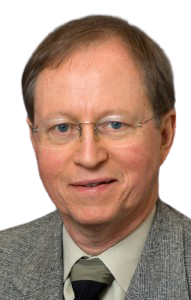
Prof. Dr. Karl Smith, Purdue University
Karl A. Smith is Cooperative Learning Professor of Engineering Education, School of Engineering Education, at Purdue University. He is also Emeritus Professor of Civil, Environmental, and Geo- Engineering, Morse-Alumni Distinguished University Teaching Professor, and Faculty Member, Technological Leadership Institute at the University of Minnesota. He has been at the University of Minnesota since 1972 and started his academic career as a materials processing engineering researcher. In 1991 he changed careers to focus on engineering education research and in 2006 he accepted a part time position as Cooperative Learning Professor, School of Engineering Education, Purdue University to help start the engineering education PhD program in the College of Engineering.

Professor Roger Hadgraft, University of Technology Sydney
Roger Hadgraft is a civil engineer with more than 25 years of experience in improving engineering education through problem- and project-based learning (PBL). He was instrumental in introducing a project-based curriculum in civil engineering at Monash University and in several disciplines at the Royal Melbourne Institute of Technology (RMIT). Roger was an Australian Learning and Teaching Council Discipline Scholar and co-author of the Threshold Learning Outcomes for Engineering and Information Technology and he has been a member of several national learning and teaching projects. He is currently Director of Educational Innovation and Research at the University of Technology Sydney with a focus on curriculum transformation towards 21st century skills.
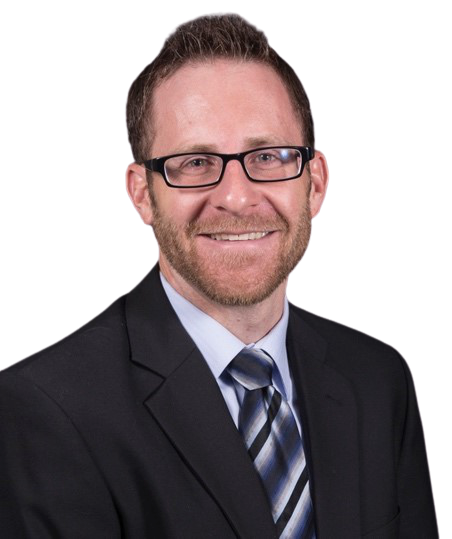
Assoc. Prof. Dr. Adam Carberry, Arizona State University
Adam R. Carberry is an Associate Professor at Arizona State University (ASU) in the Fulton Schools of Engineering (FSE), The Polytechnic School. He earned a B.S. in Materials Science Engineering from Alfred University, and received his M.S. and Ph.D., both from Tufts University, in Chemistry and Engineering Education respectively. Adam has taught a variety of courses around the topics of use-inspired design, materials science, and engineering education. He was recognized in 2016 with a Top 5% Teaching Award in FSE. His research funded by the National Science Foundation, Kern Family Foundation, and Helmsley Charitable Trust explores improving engineering education practices and assessing the conative and affective factors of engineering faculty and students. He has been recognized as an early career scholar receiving an ASEE Educational Research Methods Division Apprentice Faculty Award and a Frontiers in Education New Faculty Fellow Award. He is the former chair for the Research in Engineering Education Network (REEN), current Associate Editor for the Journal of Engineering Education, and co-moderator for the Engineering Education Community Resource Wiki (http://bit.ly/engredu). He has been recognized for his service efforts receiving the Tufts University Presidential Award for Citizenship and Public Service as well as two ASU Barrett Summer Scholars Outstanding Service Awards.
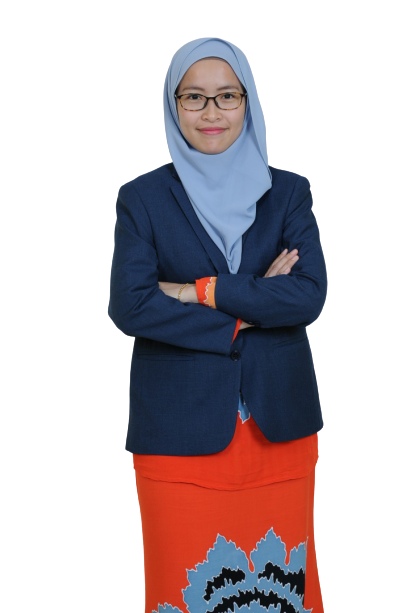
Dr. Nor Farahwahidah Abdul Rahman, Universiti Teknologi Malaysia
Dr Nor Farahwahidah Abdul Rahman is a research fellow at Centre for Engineering Education and a senior lecturer from School of Education, Faculty of Social Sciences and Humanities, UTM. She is an active researcher and have been working with researchers from engineering faculty to conduct study in engineering education. Her expertise are social science research methodology, STEM education, Education for sustainability and Epistemology of Science.
Special Session 4 : 21st Century Assessment: Supporting and Maintaining Quality Learning
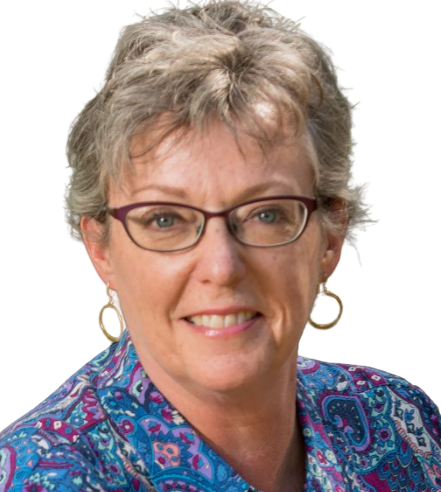
Prof. Dr. Julia M. Williams, Rose-Hulman Institute of Technology, USA
Julia M. Williams joined the faculty of the Humanities and Social Sciences Department at Rose-Hulman Institute of Technology in 1992, then assumed duties as Executive Director of the Office of Institutional Research, Planning, and Assessment in 2005. From 2016-19, she served as Interim Dean of Cross-Cutting Programs and Emerging Opportunities. In this role, she supported the work of faculty who create multi-disciplinary learning opportunities for Rose-Hulman students. Williams’ publications on assessment, engineering and professional communication, and tablet PCs have appeared in the Journal of Engineering Education and IEEE Transactions on Professional Communication, among others. She has been awarded grants from Microsoft, HP, the Engineering Communication Foundation, and National Science Foundation. Currently she supports the work of the Revolutionizing Engineering and Computer Science Departments (NSF RED) grant recipients. She has received numerous awards including the 2015 Schlesinger Award (IEEE Professional Communication Society), and 2010 Sterling Olmsted Award (ASEE Liberal Education Division).
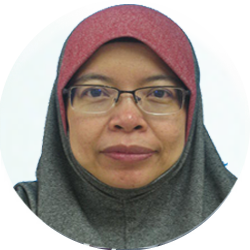
Assoc. Prof. Dr. Naziha binti Ahmad Azli, Universiti Teknologi Malaysia
Dr. Naziha Ahmad Azli is an Associate Professor at the School of Electrical Engineering, Faculty of Engineering, Universiti Teknologi Malaysia (UTM). She was formerly the Laboratory Manager at the school and was then appointed as the Undergraduate Academic Manager in 2013. She was the 4th Year Laboratory Coordinator at the school who initiated the Problem-based Laboratory (PBLab) in 2007, a transformation from the conventional to a non-conventional laboratory implementation. In 2015, she was appointed as the Deputy Dean (Academic and Development) at the Office of Undergraduate Studies (UGS). Now she is the Director
of UTM’s Curriculum Innovation and Development Unit (CIDU), under the Office of the Deputy Vice Chancellor Academic and International. Although very much acitive in her technical research in the field of Power Electronics and Drive, Dr. Naziha also supervises and evaluates PhD students in Engineering Education, a programme offered by the Faculty of Engineering. Dr. Naziha has written many papers that are published in local as well international conference proceedings and academic journals. The publication includes those related to her technical field of research as well as innovative T&L methods and experiences.
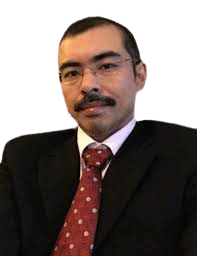
Prof. Ir. Dr. Ramesh Singh, University of Malaya, Universiti Teknologi Brunei
Ramesh Singh is a Senior Professor of Mechanical and Materials Engineering. He obtained his Bachelor of Mechanical Engineering (Hons) – First Class (1994) and PhD in Advanced Materials (1997), both from the University of Sunderland, UK. He has received many accolades as a distinguished professor and have a strong proven track record in administration, teaching and research. He has served as an Associate Director with the Engineering Accreditation Department, BEM from 2014 to 2018. He is serving in numerous capacities as consultant, external examiner, expert advisor, reviewer, editorial board members and visiting professor. Ramesh has published over 350 scientific papers, including nearly 240 peer-reviewed research papers and has completed the supervision of more than 70 postgraduate students. He has secured more than USD$ 5 million in research funding and consultancy. Ramesh is a Fellow of the Academy of Sciences Malaysia, a Chartered Engineer with the Engineering Council UK, a Chartered Professional Engineer with Engineers Australia and a Professional Engineer with the Board of Engineers Malaysia. He is also a Fellow of five prominent professional societies including the Institution of Mechanical Engineers UK and the Institution of Engineers Australia.
PLENARY FORUM SESSIONS
Plenary Forum 1: Leadership

Professor Roger Hadgraft, University of Technology Sydney
Roger Hadgraft is a civil engineer with more than 25 years of experience in improving engineering education through problem- and project-based learning (PBL). He was instrumental in introducing a project-based curriculum in civil engineering at Monash University and in several disciplines at the Royal Melbourne Institute of Technology (RMIT). Roger was an Australian Learning and Teaching Council Discipline Scholar and co-author of the Threshold Learning Outcomes for Engineering and Information Technology and he has been a member of several national learning and teaching projects. He is currently Director of Educational Innovation and Research at the University of Technology Sydney with a focus on curriculum transformation towards 21st century skills.
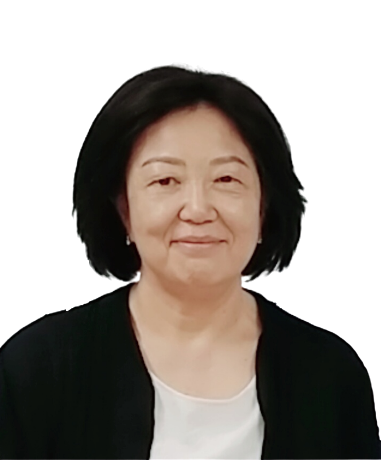
Professor Myongsook Susan Oh, Department of Chemical Engineering, Hongik University, Korea
Myongsook Oh is a professor of Chemical Engineering Department at Hongik University in Seoul. She obtained a B.S. degree in chemical engineering from the University of California at Berkeley, and a Sc. D. from the Massachusetts Institute of Technology (MIT). Before joining Hongik University, Dr. Oh was associated with Lawrence Livermore National Laboratory (LLNL) and Texaco, Inc in the U.S. Starting from her Sc. D. thesis on softening coal pyrolysis, she worked on the conversion of fossil fuels for over 30 years, concentrating on the transformation of ashes. The other area that Dr. Oh devotes her efforts is to develop women in engineering programs and educational contents. She authored several articles on engineering education for female students as well as research papers. She is also very active in the professional societies. Currently, she is the chair of the Board of Women in Science, Engineering & Technology (WISET) Centre, president of the Korean Society for Engineering Education, and a former president of Women in Science, Engineering, and Technology in Korea. She is a member of the National Academy of Engineering of Korea (NAEK).
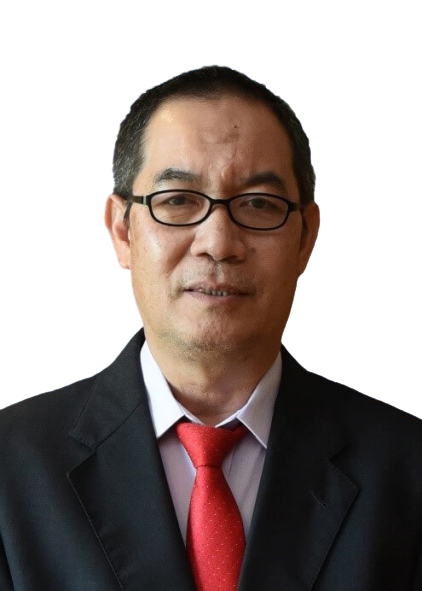
Dato’ Prof. Ir. Dr. Mohd. Saleh Jaafar, Former Deputy Director-General of Higher Education, Ministry of Education
YBhg. Dato’ Prof. Ir. Dr. Mohd Saleh bin Jaafar was formerly the Director General of Higher Education (Academic & Development), Ministry of Education Malaysia. He plays significant role as the Deputy Chair in the development of the Malaysia Education Blueprint 2015-2025 (Higher Education) and currently tasks to implement the initiatives outlined in the Blueprint specifically for the private higher education institutions. He oversees and co-authors these transformation documents. He holds a Ph.D (Structures) from Sheffield University, United Kingdom, MS (Structures) from University of Michigan and BSc (Civil Engineering) from Michigan State University. At the professional level, YBhg. Dato’ Prof. Ir. Dr. Mohd Saleh bin Jaafar was appointed as a Board Member of Intellectual Property Corporation of Malaysia (MyIPO) and Member of Board of Directors of Universiti Teknologi MARA (UiTM). He is a registered engineer under the Board of Engineers Malaysia. He is also the Fellow Academy of Sciences, Malaysia as well as the Member American Society of Civil Engineers. He is the Founding Council Member European Silk Roads University Consortium (ESRUC) and the Founding Member, University Networks for Tropical Agriculture. Dato’ Prof. Ir. Dr. Mohd. Saleh Jaafar believes in bringing out the best from people and believes everyone can create values for the organization. His leadership style can be summarized as Listen, Learn and Lead.
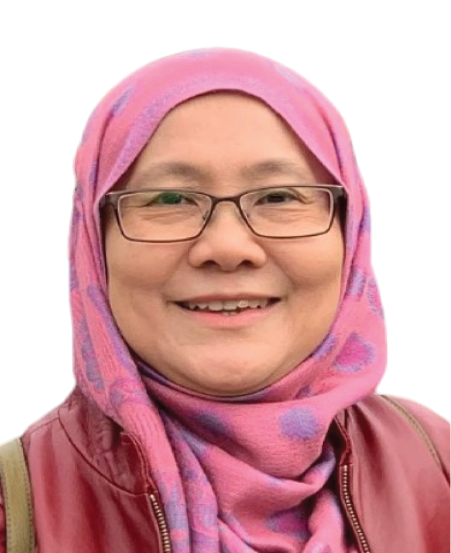
Ir. Dr. Siti Hawa Hamzah, Director (EAD & ETAD) Board of Engineers Malaysia
Ir. Dr. Siti Hawa Hamzah (PhD, P.Eng PC, FIEM, Hon MAFEO ASEAN Engr, MRM, MPN, PSWM) obtained her BSCE, Cert. of Education, MSCE from USA and PhD from UKM. Currently, an Associate Director (Civil Engineering) Accreditation Department BEM, the IEA mentor to Bangladesh Board of Accreditation for Engineering and Technical Education into Washington Accord Full Signatory Membership, OBE Trainer (CEE UTM – MOHE Afghanistan World Bank Project), BEM Lead Accreditation Evaluator, P.Eng Principle Interviewer, and BEM T&E Committee Member. A retired Professor (Civil & Structural Engineering), Faculty of Civil Engineering, UiTM Shah Alam, Past Associate Director (Structural) EAD, Past Council Member IEM and Past Excomm IEM. Had over 33 years teaching and academic experience with 20 years experience managing engineering programmes; accreditation evaluator’s experience in more than 100 programmes; completed 21 research projects; authored 11 books in structural engineering, published more than 165 technical papers, and accreditation videos on You Tube.
Plenary Forum Session 2: Engineering Education Current Status and Way Forward

Prof. Dr. Karl Smith, Purdue University, University of Minnesota
Karl A. Smith is Cooperative Learning Professor of Engineering Education, School of Engineering Education, at Purdue University. He is also Emeritus Professor of Civil, Environmental, and Geo- Engineering, Morse-Alumni Distinguished University Teaching Professor, and Faculty Member, Technological Leadership Institute at the University of Minnesota. He has been at the University of Minnesota since 1972 and started his academic career as a materials processing engineering researcher. In 1991 he changed careers to focus on engineering education research and in 2006 he accepted a part time position as Cooperative Learning Professor, School of Engineering Education, Purdue University to help start the engineering education PhD program in the College of Engineering.
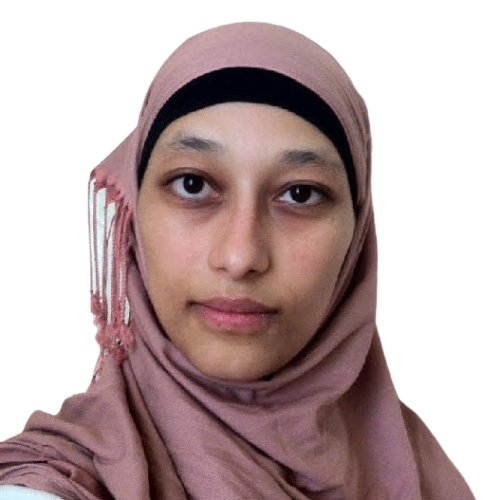
Assistant Professor Sanae El Hassani, National School of Applied Sciences (ENSA) of El Jadida, Morocco
Sanae EL HASSANI obtained her master engineering degree in telecommunications from Telecom-Bretagne, France, in 2007. She worked at Orange Labs (France Telecom R&D) from 2007 to 2010 as an R&D engineer and received the PhD degree in Signal Processing and Telecommunications from Telecom-Bretagne & Université de Rennes I in 2011. She is currently assistant professor at ENSA EL-Jadida, Chouaïb Doukkali University, Morocco. Her fields of interest include advanced modulations, error correcting codes and communication technologies, as well as enginering education and engineering service learning.
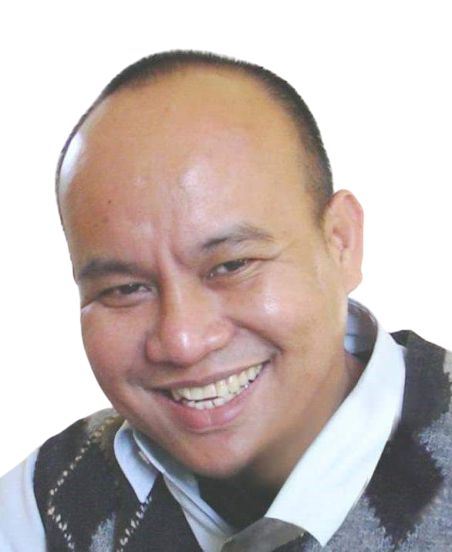
Dr. Dany C. Molina, Dean of the College of Engineering of Central Philippine University (CPU)
Dany C. Molina is the national president of the Philippine Association of Engineering Schools, a unifying organization for the advancement of engineering education. He is also Dean of the College of Engineering of Central Philippine University (CPU). He received his Master of Science in Mechanical Engineering from the University of the Philippines and his Post-Masteral Study in the University of New South Wales, Australia.
He is passionate about quality Engineering Education. As such, he is a Program Evaluator of the Philippine Technological Council, Accreditation and Certification Board for Engineering and Technology; Commission on Higher Education’s Office of Institutional Quality Assurance and Engineering and Architecture Regional Quality Assessment Team. He is also an Accreditor of the Philippine Accrediting Association of Schools, Colleges and Universities.
He had trainings in the Milwaukee School of Engineering, USA and the Haggai Institute, Hawaii, USA. As a Freeman Fellow of the United Board for Christian Higher Education in Asia, he was a visiting fellow at Baylor University, USA and Tunghai University, Taiwan. Over the last two years, he was team leader of faculty sent to institutions with which CPU has established linkages, namely: ZhengZhou University of Industrial Technology, China; Fukuoka University and Fujishita Company Ltd., Japan; Case Western Reserve University, and the University of California Berkeley, USA.

Dr. techn. Sholihin As’ad, Universitas Sebelas Maret (UNS), Indonesia
Dr.techn. Sholihin As’ad is currently an associate professor in Civil Engineering and Dean of Faculty of Engineering Universitas Sebelas Maret (UNS), Indonesia. He graduated from Bachelor and Master in Civil Engineering, Institute of Technology Bandung (ITB), Indonesia in 1992 and 1999. He received Dr. techn in Civil Engineering at University of Innsbruck, Austria in 2006. After spending eight years of early part of his career in civil engineering consultancy, he then moved to university career in Universitas Sebelas Maret (UNS). He with his colleagues consistently improved the academic process through international accreditation or certification and initiated the outcome based education (OBE) curriculum for the whole programs in Faculty of Engineering Universitas Sebelas Maret (UNS). His research interest is concrete technology, building and infrastructure rehabilitation and maintenance, concrete structure and sustainable issue in civil engineering. As well his administrative and teaching duties, he engaged regularly with industries in Indonesia and with local and international researchers.
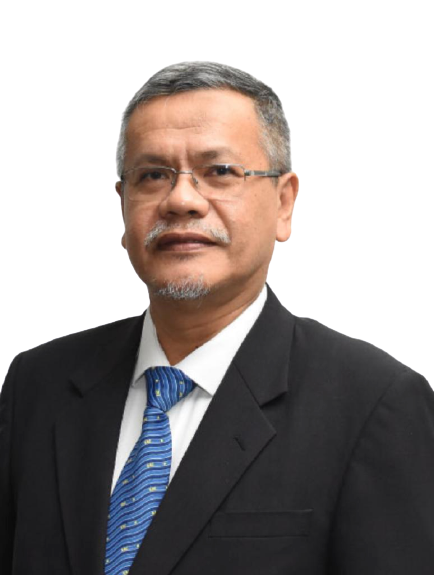
Assoc. Prof. Ir. Abdul Aziz Omar, Sunway University, Malaysia
Assoc. Prof. Ir. Abdul Aziz Omar is currently the Director of Engineering Program development at Sunway University.
Ir. Abdul Aziz completed his tertiary education in the United States, where he obtained his Masters and Bachelor degrees from Ohio University. While his undergraduate training was in Chemical Engineering and Chemistry, his post graduate specialisation was in Environmental Studies. Assoc. Prof. Ir. Abdul Aziz has over 19 years of experience as an academician, 6 years as a process/project engineer and 7 years as a senior manager. He has worked on many projects related to the environment, safety studies and process engineering design. Among his many experiences was the setting up of the School of Chemical Engineering at Universiti Sains Malaysia in 1993. He was appointed the founding Dean of the School. In March 2001, Assoc. Prof. Ir. Abdul Aziz joined UTP, where he was the Associate Professor in Chemical Engineering until 2016. He was Director of Engineering and Engineering Technology Accreditation Departments at the Board of Engineers Malaysia 2017 to January 2020.
Assoc. Prof. Ir. Abdul Aziz is a registered Professional Engineer in Chemical Engineering with the Malaysian Board of Engineers since 1989, and Chartered Engineer from United Kingdom from 2006. He is a Fellow of the Institution of Chemical Engineers (IChemE), UK.
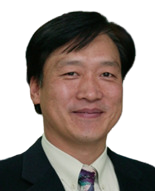
Professor Il Moon, Yonsei University, Korea
Dr. Il Moon is Professor of Chemical Engineering at Yonsei University since 1993. He is also president-elect of Korean Society of Engineering Education, a member of National Academy of Engineering, former president of Korean Society of Hazardous material, former Presidential Advisory Council on Education, Science and Technology in Korea, former general director of Korean National Research Foundation, and president of Korea Engineering Education Research Center. His main research area is to develop appropriate tools and methodologies for the synthesis and analysis of various chemical processes. He has achievement in hydrogen safety research; developing virtual reality education program for hydrogen fueling station, writing books and papers.

Professor Abdel Magid Hamouda, Qatar University
Dr. Abdel Magid Hamouda is currently working as Professor and Associate Dean at College of Engineering, Qatar University. He has completed his Ph.D. in Manufacturing Engineering from Dublin City University, Ireland. He is member of American Society of Mechanical Engineers (ASME), Institute of Highway Transportation (IHT), Senior Member of Institute of Industrial Electrical (IIE), and Fellow of Royal Society of Arts. Previously he was appointed as Research Manager, Assistant Professor and Professor at University Putra Malaysia, work at National Mills Company, and Consultant at Ministry of Transportation Malaysia. Dr. Abdel Magid Hamouda was received number of honor includes winner of Takreem Scientific and Technological Achievement Award, one of the highest awards in the Arab world, second Place Winner for Arab Business Plan, Jordan, Winner of QU Merit Award for 2010 and 2014, Gold Medal, British Invention Show 2004 and 2006, London, UK, and UPM Vice Chancellor Excellence Service Award. He has published 9 research articles in journals as author/co-author.
Plenary Forum 3: Women in Engineering: Understanding Essential Issues to Unlock the Potential Within
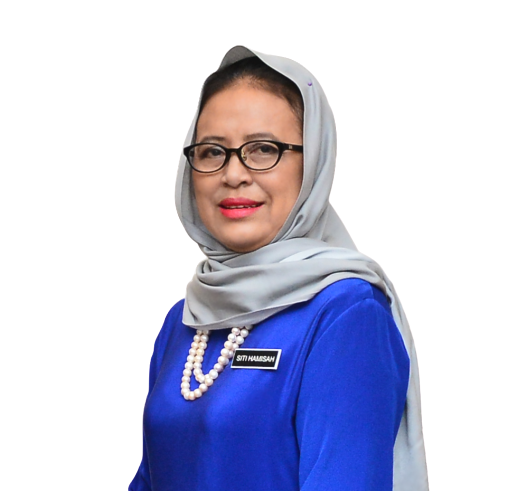
Datuk Ir. Dr. Siti Hamisah binti Tapsir, Secretary-General, Ministry of Science, Technology & Innovation (MOSTI)
Datuk Ir. Dr. Siti Hamisah is currently the Secretary General of Ministry of Science, Technology and Innovation Malaysia (MOSTI) since March 2020. Datuk Ir. Ts. Dr. is responsible for research, development, commercialisation and innovation grants as well as debt and equity agencies that focus on technology startups. Datuk Ir. Dr. also has an extensive experience in higher education as the Director General and Deputy Director General of Higher Education Department since 2009 before being appointed as Secretary General of Ministry of Energy, Science, Technology and Climate Change (MESTECC) in 2019. She continues to provide the leadership needed in connecting strategically the government, academia, and industry for the economic advancement and societal well-being pillaring in science, technology and innovation – a passion she always holds dearly. Datuk Siti has also served as academia in Universiti Teknologi Malaysia and professional engineer earlier in her career.
On professional level, she is a registered Technologist with Malaysia Board of Technologists and a registered engineer under the Board of Engineers Malaysia. Datuk Ir. Dr. Siti Hamisah received her PhD in Civil Engineering from University of Leeds United Kingdom and Honorary Doctorate (Doctor of Science) from the University of Southampton in 2016 for her outstanding contributions in the engineering field. She has received numerous education accolades including the Asia HRD Awards 2017 for her contributions to the Malaysian Society by advancing higher education and the Honorary Fellow of ASEAN Federation of Engineering Organisations (AFEO) in 2017 for her expertise and experience in advancing the growth of engineering in the ASEAN region.
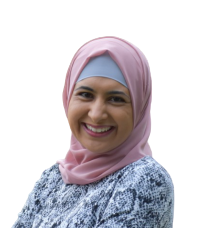
Naadiya Moosajee, WomEng & WomHub Co-Founder
Naadiya is a serial entrepreneur by passion, a civil engineer by training, is Co-Founder at WomHub, an entrepreneurship incubator, ed-tech and advisory firm developing maker labs, incubators, accelerators and a VC fund for female founders in STEM in Africa. She serves as the CIO with her focus being on gender in AI and cybersecurity. Naadiya also co-founded WomEng, a global social enterprise developing women and girls for the engineering and tech industry including a commitment at the UN in partnership with UNESCO to empower 1 million girls through STEM education. Naadiya serves as an independent board director at the MMI Foundation, the chair of the board at the TQMF trust, and is an emeritus board director for the International Youth Foundation in the USA and Pegasys Strategy and Development, a private management consultancy firm. Naadiya serves as an advisory board member for the University of Cape Town Faculty of Engineering, was a Global Future Council Member with the World Economic Forum: Gender, Education and the Future of Work. Naadiya is an Aspen Institute New Voices Fellow, a renowned speaker, and was named “Top 20 Young Power Women in Africa” by Forbes Magazine. She is a Co-Chair for the Saudi Arabia B20 Task Force on the Future of Work and Education. Naadiya is a global leader in gender, inclusion, entrepreneurship and innovation focussing on the engineering and technology industries. She also owns a restaurant group which houses 2 Turkish restaurants in Cape Town. Naadiya has worked across 24 countries to revolutionise the face of engineering through diversity, inclusion, innovation, entrepreneurship and education. She is passionate about equitable technology, fostering prosperity in emerging economies and engineering better societies.
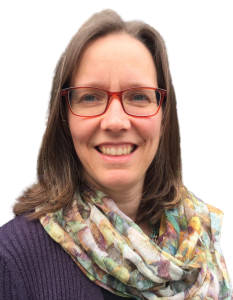
Professor Shannon Chance, Technological University Dublin, Ireland
Professor Shannon Chance, PhD, SFHEA, LEED-AP, is a Registered Architect holding Bachelor’s and Master’s degrees in Architecture from Virginia Tech and a PhD in Higher Education from William and Mary. She is Lecturer and Programme Chair (Honours BSc in Digital Construction) at Technological University Dublin. She is also a Visiting Professor at University College London, Chair of the Research in Engineering Education Network (REEN), and Associate Editor of IEEE Transactions on Education. In the past, she has served as Professor of Architecture in the USA, Fulbright Fellow to Ireland, and Marie Curie Research Fellow to both Ireland and the UK.
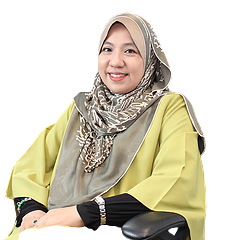
Ts. Sharifah Zaida Nurlisha binti Syed Ibrahim,
President, Malaysian Oil & Gas Services Council (MOGSC)
Sharifah Zaida Nurlisha received her Bachelor of Electrical and Engineering degree (BEng(Hons)) and Masters in Business Administration (MBA) from Nottingham University, England.
She began her career as an Instrument Engineer in Sime Engineering Sdn Bhd in 1990 before moving to Project Management discipline, with MMC Oil & Gas Engineering Sdn Bhd in 1995. Her experiences encompasses Project Engineering experiences to Project Manager of different types of Oil & Gas contracts before assuming her current position as CEO in MMC Oil & Gas Engineering Sdn Bhd.
In her 29 years in the oil & gas industry, she have been involved in projects ranging from Conceptual, FEED, Detailed, Fabrication/Construction and Hookup and Commissioning, EPCC and EPCIC projects locally and also outside of Malaysia.
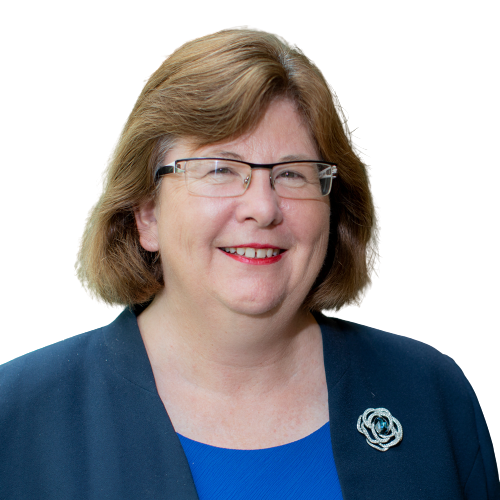
Assoc. Prof. Dr. Anne Gardner, University of Technology Sydney
Experienced engineering academic with a demonstrated history of working in the higher education industry. Skilled in Education Research Design, Lecturing, Structural Engineering, and Academic Writing. Strong education professional with a Doctor of Philosophy (Ph.D.) focused in Engineering Education from University of Technology Sydney.
